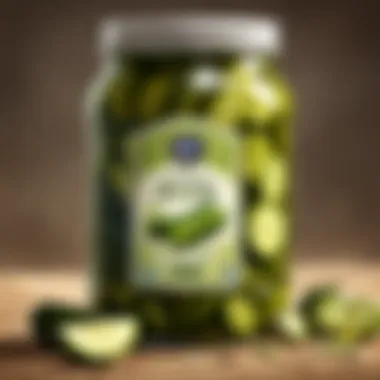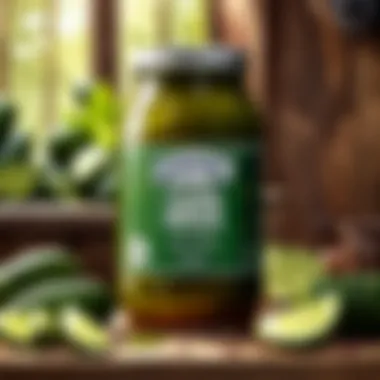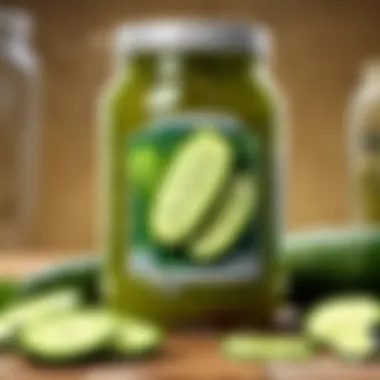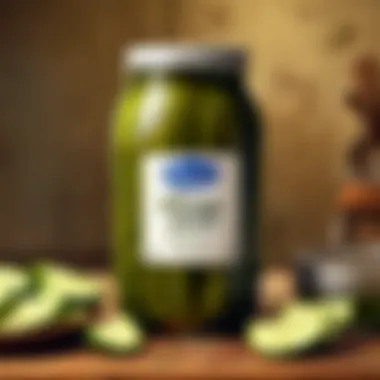Discovering the Many Uses of Pickle Juice Beyond Food


Intro
Pickle juice often sits in the background, overshadowed by its dill-filled counterparts. However, the merits of this often discarded brine merit deeper exploration. Beyond simply being a condiment or waste, pickle juice has shown a unique versatility across various usages that span health, culinary applications, and even cultural practices.
This article aims to peel back the layers of pickle juice, shedding light on nutritional benefits, distinctive uses in cooking, and the surprising role it plays in diverse dietary habits. By the conclusion, readers will possess a profound understanding of the many attributes tied to this seemingly ordinary liquid and how it can enrich daily life.
Nutritional Benefits
Pickle juice is not merely a flavorful byproduct; it also offers numerous health features. Rich in vinegar, it can reflect benefits such as blood sugar control and hydration. It’s notable for containing antioxidants, which contribute to overall wellness.
Key Nutritional Highlights:
- Electrolytes: Contains sodium and potassium, useful for hydration.
- Vinegar Content: Lowers blood sugar post-meals when combined with food.
- Weight Management: Some studies suggest it might aid in moderate appetite control.
Culinary Uses
In the kitchen, pickle juice can elevate dishes uniquely. Many chefs have started recognizing its potential beyond pickles.
Creative Uses Include:
- Marinades: Incorporate pickle juice into marinades for meats for tenderness and flavor.
- Salad Dressing: Mix with oil and herbs for a zesty dressing.
- Debone Chicken: Soak chicken in pickle juice prior to cooking for flavorful meat.
Practical Applications
The applications of pickle juice extend even further.
- Digestive Aid: A small amount can be consumed before meals to ease digestion.
- Muscle Cramps: Athletes often drink pickle juice for quick relief during muscle cramps.
- All-Purpose Cleaner: The acidity of pickle juice allows it to act as a mild cleaner in the kitchen briefly.
Cultural Significance
It is interesting to note the cultural values surrounding pickle juice in different regions. Some cultures process these drinks into components of their traditional dishes, showcasing their role in heritage.
Notable Instances:
- In Southern US cuisine, dishes often highlight the use of pickle juice bumped into ingredient funnels.
- In markets across different nations, numerous recipes employ pickle brine as a mainstay for flavor enhancements.
Culmination
In essence, pickle juice exists as more than an unassuming afterthought. Its benefits and uses span nutritional insight, versatile culinary applications, and address practical needs while affirming it as a cultural artifact. Embracing the jar of pickle juice may lead one to unexpected discoveries, making what once was cast aside valuable again.
Foreword to Pickle Juice
Pickle juice has gained attention in recent years for its diverse applications. Rather than being confined to the bottom of a jar, it finds itself in numerous discussions surrounding nutrition, health, and even culinary innovation. This discussion is vital because pickle juice] offers various surprising benefits that are often overlooked. Understanding its definition and backstory helps articulate its remarkable versatility as both an ingredient and a health tool.
Definition and Composition
Pickle juice is the liquid remaining after pickles have been prepared. Its basic components include water, vinegar, salt, and various spices. While there are variations depending on the type of pickles—dill pickles or bread-and-butter pickles, for example—the core ingredients conserve much of their original nutritional value. Notably, this liquid contains significant amounts of sodium, potassium, and a small number of calories. The sour flavor derives primarily from the vinegar and may include additional tangy notes depending on the specific blend of spices used.
Backstory of Pickle Juice
The history of pickle juice dates back to ancient civilizations. It's believed that the process of pickling began in Mesopotamia around 2400 B.C. Vegetables, including cucumbers, were preserved in a brine solution to store for longer periods. With time, this technique spread across regions, and pickle juice became more than a mere byproduct. Historical enthusiasts note that Roman soldiers would consume it to maintain hydration and gain vitality. Its place in various cultures is well established; each has its method for deriving maximum flavor and benefits.
Today, pickle juice finds increased popularity beyond just a condiment for sandwiches or burgers. It represents a multifaceted resource, gaining recognition in health discussions, localized agriculture experiments, and innovative culinary recipes.
Nutritional Benefits of Pickle Juice


Pickle juice is not just a flavorful byproduct of the pickling process; it also boasts several nutritional benefits that deserve attention. As consumers become more health-conscious, pickle juice emerges as an appealing supplement for those looking for natural ways to enhance their diet. The benefits are diverse and can significantly contribute to one's overall wellness.
Electrolyte Restoration
One of the most significant advantages of pickle juice is its ability to restore electrolytes in the body. When engaging in prolonged activities, such as sports or physical exercise, the body loses essential electrolytes through sweat. Pickle juice, being rich in sodium and potassium, can help replenish these lost minerals. This feature is particularly beneficial for athletes seeking to maintain hydration levels and prevent cramps during or after intense physical activities.
In a study conducted on athletes, those consuming pickle juice showed significant improvements in performance post-exercise, with quicker recovery times. Hence, consuming even small amounts of pickle juice can aid hydration effectively, making it an appealing option for people with active lifestyles.
Potential Weight Loss Aid
Another area where pickle juice shines is its potential role in weight management. Research links vinegar, a component of pickle juice, to enhanced metabolism and appetite regulation. The acetic acid found in vinegar may help individuals feel fuller for extended periods, reducing overall food intake.
Several reports suggest that incorporating pickle juice into a balanced diet can help with portion control. It's vital to note that while it supports weight loss efforts, it should be coupled with a healthy diet and exercise for best results. Awareness and moderation remain crucial when integrating this tangy liquid into one's daily routine.
Digestive Health
Lastly, pickle juice may offer benefits for digestive health. It contains probiotics, especially if fermented. Probiotics are known to assist in maintaining a healthy gut flora, which contributes to overall digestive efficiency. Taking pickle juice in moderation might support gut health, leading to beneficial effects on digestion and a reduction in common ailments like bloating.
Furthermore, its acidic nature provides a means of stimulating the stomach digestion process, which is valuable for many. Nonetheless, excessive intake may lead to discomfort, so being mindful of portion size remains important.
In summary, pickle juice presents a variety of nutritional benefits ranging from electrolyte replenishment to supporting weight management and digestive health. By embracing this unique liquid, individuals may enhance their diets while uncovering new culinary uses.
Culinary Uses of Pickle Juice
Culinary uses of pickle juice extend beyond mere flavoring; it serves as a critical ingredient that enhances taste and quality in various dishes. Understanding this versatility increases appreciation for pickle juice and encourages its integration into everyday cooking. The sourly tangy liquid not only adds distinctive flavor profiles but also has practical applications that can elevate any dish.
Marinade and Salad Dressing
Once regarded as an afterthought, pickle juice has gained recognition as a flavorful marinade for diverse proteins like chicken, pork, and tofu. The acidity in pickle juice breaks down the meat fibers, making them more tender while instilling a sharp flavor. It acts similarly to a traditional marinade, combining well with herbs and spices for diverse tastes.
When it comes to salad dressings, pickle juice brings a unique twist. Mixing it with olive oil or yogurt can create zesty dressings for salads. The acidic quality helps synthesize the flavors of various ingredients. This innovative use not only adds depth but also reduces waste by utilizing something often tossed away.
Flavor Enhancer in Recipes
Beyond marinades, pickle juice can be utilized as a flavor enhancer across myriad recipes. Incorporating it into dips, sauces, and soups provides a tangy, refreshing taste that cuts through richness. For instance, a splash can elevate potato salad, beans, and other starchy dishes by enlivening the richness.
Additionally, adding pickle juice to recipes such as deviled eggs or coleslaw introduces a crunch and zest that may not otherwise be present. Many home cooks now rely on pickle juice when cooking beans and lentils to ensure adequate flavor is infused during preparation.
Use in Pickling Other Foods
One of the most traditional uses of pickle juice is, unsurprisingly, pickle preparation. This versatile liquid can be repurposed to create new pickled items, such as onions, carrots, or radishes. The seasoned brine adds a distinctive flavor that novel vegetables acquire quickly.
The seasoning in pickle juice often renders a harmonious balance, encouraging experimentation with various produce. Moreover, reusing pickle juice not only demonstrates creativity but also aligns with sustainability practices aimed at waste reduction.
In summary, cherry-picking the qualities of pickle juice allows it to transform standard culinary practices. The culinary landscape is undoubtedly more thrilling with the incorporation of this lively ingredient. Embracing its multifunctional nature reveals its potential enhancement not only in flavor but also in nutritional incorporation when planned adequately.
Health and Wellness Applications
Pickle juice has gained attention for its potential role in health and wellness. This segment explores why these applications are not just trivial pursuits, but rather genuine focal points in modern health discussions. Understanding how pickle juice can contribute to hydration and relieve muscle cramps is fundamental, especially for those engaging in physical activities.
Hydration After Physical Activity
After exercise, rehydrating is crucial. Many athletes and active individuals seek effective ways to recover. Pickle juice is often touted for its hydrating properties. The sodium content in pickle juice can assist in replenishing lost electrolytes. This is critical, as many sports drinks may not always fully address electrolyte replenishment aligned with personal needs.
Contents of pickle juice help to quickly restore body fluids. Drinking pickle juice can be beneficial after an intensive workout when dehydration peaks.
Factors that make pickle juice advantageous include:


- Electrolyte content: High in sodium and potassium, leveling with standards for success in fatiguing circumstances.
- Speed of absorption: Quickly reintroduces vital nutrients, benefitting recovery rates after strenuous efforts.
- Minimal sugar: In contrast to typical sports drinks that can contain high amounts of sugar, pickle juice offers a less sweet alternative with necessary nutrients.
“Pickle juice not only tastes unique, but it can also offer hydration benefits after one’s training. For dedicated fitness fans, picking a remedy that is close to natural with functional ingredients matters.”
Relief from Muscle Cramps
Muscle crampspose a significant issue, particularly during workouts or sports. Pickle juice is frequently recommended as a natural remedy to alleviate such discomforts. Some studies suggest that the vinegar in pickle juice may play a beneficial role in preventing cramps.
The main points to note regarding relief from muscle cramps include:
- Fast acting: Anecdotal evidence and studies indicate that consuming collar pickle juice can shorten the duration of cramps. Timing and purpose are crucial for avoiding prolonged discomfort during athletics.
- Vinegar's effect on nerves: Some research explains that the interaction between the acidic components found in vinegar, like that in pickle juice, can positively affect nervous responses, potentially ceasing cramping incidents sooner.
- Accessibly solution: For casual exercisers, having accessible tools for cramps can empower their workouts and daily athletics. Having pickle juice within easy reach serves as a practical option.
Pickle Juice in Popular Culture
Pickle juice has gained a unique place in popular culture. Its variety of uses and health benefits have helped it resonate beyond kitchens and health clubs. Examining its presence reveals a cultural fascination with this briny liquid, connecting different elements of lifestyle, creativity, and even regional identity.
Historical Context
The role of pickle juice is not a modern phenomenon. Historically, it had various practical applications. For instance, during wars, pickle juice helped sailors prevent scurvy. The high vinegar content provides antioxidant benefits that were essential when fresh produce was scarce. Even today, certain communities continue to celebrate this traditional drink.
Additionally, folklore and anecdotes often mention pickle juice in stories and legends. Certain cultures valued the juice for its believed healing properties. Thus, the historical context of pickle juice sets a rich foundation for understanding its current relevance.
Symbolism Across Cultures
Many cultures attach varying meanings to pickle juice, making it a fascinating subject of cultural symbolism. For instance, in Eastern European countries, this brine acts as a remedy for hangovers. The notion stems from its restorative capabilities after indulgent celebrations. In contrast, within Southern United States cuisine, pickle juice is often regarded as a unique secret ingredient, reflecting a blend of creativity and tradition.
In the realm of social media, pickle juice has developed a persona, becoming a popular subject for memes and challenges. On platforms like Reddit and Facebook, it enjoys a community of eclectic fans sharing innovative uses and recipes. This versatility not only caters to culinary needs but infuses social engagement and lifestyle enrichment.
Scientific Research on Pickle Juice
The study of pickle juice in a scientific context extends well beyond culinary curiosity. Its multifaceted benefits and effects on human health spark genuine interest among researchers and health enthusiasts alike. Various studies aim to elucidate the actual advantages of pickle juice, particularly regarding hydration, performance enhancement, and broader health benefits. Understanding these elements is crucial in elevating pickle juice from a mere byproduct of pickling, a usually overlooked waste, to a recognized staple in health discussions.
Studies on Hydration and Performance
Research examining the hydration properties of pickle juice outlines a compelling relationship between electrolyte replenishment and physical performance. Athletes frequently seek effective strategies for rapid rehydration, especially after intense exertion. Studies indicate pickle juice's high sodium content assists in restoring sodium balance after activities, which is vital, particularly for endurance athletes. It has been reported that consuming pickle juice may reduce the duration of dehydration symptoms and help maintain optimal levels of fluid.
Moreover, one notable study illustrates that subjects who consumed pickle juice tended to choose fewer hydration breaks during endurance tasks. This suggests that the presence of electrolytes like sodium and potassium might enhance thirst response, leading to improved hydration efficiency. While the notion of becoming a pickle juice enthusiast may seem unconventional, this drink offers a simple option for individuals needing quick rehydration after heavy workouts.
Research on Health Benefits
Beyond hydration, numerous studies investigate the assorted health benefits attributed to pickle juice consumption. Among the most examined are its purported roles in weight management and digestive health. The acetic acid present in pickle juice seems to influence appetite regulation and digestive efficiency. Some preliminary findings signal that it could play a part in maintaining stable blood sugar levels, which could be beneficial for those managing weight.
Also of note, studies suggest that replacing sodium from traditional supplements with pickle juice post-exercise can support muscle recovery by minimizing soreness. Additionally, the presence of probiotics in some pickled products further demonstrates its potential digestive benefits. Various strains of probiotics can support gut health and promote effective digestion.
Both hydration and health benefits linked to pickle juice pinpoint the necessity for more targeted research to solidify these claims. The existing research serves as a foundation for understanding the complexities and possible positive effects of incorporating pickle juice in everyday dietary habits. Subsequent advancements or revelations in scientific inquiry could further redefine how we value this humble jar in our kitchens.
"While the evidence is not exhaustive, the potential applications of pickle juice in health promotion establish a strong case for detailed future studies."
The increasing curiosity around these aspects highlights how something as simple as pickle juice may contribute more to our well-being than was previously understood.
Environmental Impact of Pickle Juice Production
The production of pickle juice, though often overlooked, carries significant environmental considerations. Understanding these impacts highlights the importance of sustainable practices in preserving natural resources and minimizing pollution. The multifaceted nature of pickle juice production includes agricultural practices, energy consumption during manufacturing, and transportation implications. Addressing these factors holds not only ecological benefits but also contributes to healthier communities and sustainable economies.
Sustainable Practices in Pickle Manufacturing


Sustainable practices in pickle manufacturing often begin with the sourcing of cucumbers and other vegetables. Farmers implementing organic methods reduce the need for pesticides that can harm local ecosystems. Such farms conserve water more effectively and enhance soil health.
Some manufacturers are now focusing on partnerships with local producers. Reducing transportation distances cuts carbon emissions. Additionally, energy-efficient machinery is being adopted. These machines use less energy in processing, lowering their overall footprint.
Using biodegradable or recyclable materials for packaging is also vital. Brands are exploring eco-friendly jars and labels, which lessen the long-term waste output. Such strides demonstrate a commitment to the environment while offering consumers clearer options for ethical purchasing.
Recycling and Waste Management
Recycling and waste management play crucial roles in the environmental impact of pickle juice production. The juice itself can be reinterpreted beyond its primary use. Waste generated during manufacturing, such as leftover produce scraps, can be redirected. Composting these byproducts enriches soil while reducing landfill contributions.
Many companies are also fixing closed-loop systems. This means reusing water during the rinse phase to lower water waste. Stringent waste-reduction strategies enable producers to capitalize on resources better and reduce unnecessary waste in landfills.
Key points of effective recycling strategies include:
- Encouraging consumer recycling methods for jars
- Collaborating with local recyclers to assure proper processing
- Educating customers on disposal.
The pursuit of efficiency in both the usage and management of pickle juice exemplifies a broader trend in sustainable food production. Together, these practices foster greater responsibility in industry operations and consumer habits. The outcome leads to not only healthier products but a more sustainable planet.
“Sustainable manufacturing principles are critical in today's production systems to mitigate environmental impact.”
Innovative Uses of Pickle Juice
Delving into the innovative uses of pickle juice reveals its multidimensional role beyond the traditional culinary applications. Its unique properties allow for an array of creative and beneficial uses that resonate with health, sustainability, and lifestyle enhancement. Utilizing pickle juice can save costs and resources while enhancing various experiences. From crafting distinctive cocktails to serving practical purposes in gardening, understanding these innovative approaches adds much value to the basic liquid you can find at the bottom of a pickle jar.
Uses in Cocktails and Mixology
In recent years, pickle juice has transitioned from a simple condiment to an intriguing component in the world of cocktails and mixology. Some bartenders experiment, recognizing that its sharp, tangy flavor can add a unique twist to drinks. The juice introduces complex layers, playing well with spirits while offering an unexpected element in concoctions. For example, the famed
DIY Applications for Pickle Juice
Pickle juice offers more than just a flavorful addition to your meals. The topic of DIY applications for pickle juice emphasizes its potential in creating unique products and enhancing household utilities. Through sustainable practices, individuals can repurpose this liquid, promoting creativity, practicality, and environmental responsibility.
Homemade Pickle Products
Creating homemade pickle products can be a rewarding endeavor for culinary enthusiasts. Using pickle juice, people can experiment with different vegetables and enhance the crunchiness of traditional picks. Beet roots, jalapeños, and even carrots can become infused with new flavors, elevating standard fare.
When preparing homemade pickles, selecting high-quality ingredients remains essential. Fresh produce adds vibrant flavors, while using pickle juice ensures that each bite maintains the distinct tang they are known for. Considerations such as the balance of spices and garlic offer the opportunity to customize each recipe. These homemade pickles have a taste profile that commercial versions might lack. Not to forget, homemade options allow for controlling preservatives and additives, making them a healthier choice.
Creative Household Uses
Beyond culinary projects, pickle juice serves as a versatile problem-solver in various household tasks. This liquid can play unique roles outside of the kitchen. For example, you might find that diluting pickle juice with water creates an effective cleaning solution. This is particularly helpful for tasks like removing stubborn stains or refreshing surfaces.
Furthermore, a surprising application lies in gardening; pickle juice can act as a pest deterrent. When combined with water and spray equipment, it provides a valuable natural means of keeping plants healthy. Although, use discretion since high salt content can affect some plants negatively.
In summary, the DIY applications of pickle juice not only tap into culinary creativity but also extend into practical, eco-friendly household solutions. Making these applications a part of daily life leads to resourcefulness, lowers waste, and showcases the true potential of leftover ingredients.
"Repurposing what you have at home not only saves money, but also decreases environmental impact."
Ending: The Future of Pickle Juice
The discussion surrounding pickle juice has evolved significantly in recent years. As people become increasingly aware of health and nutrition, this versatile liquid is gaining traction beyond its simple role in preserving cucumbers. This section focuses on the evolving landscape of pickle juice in culinary arts and its implications for potential research and development opportunities. Understanding what makes pickle juice valuable opens the door to more innovative applications.
Evolving Trends in Culinary Arts
In the realm of culinary arts, pickle juice is no longer considered a byproduct. Many chefs and home cooks are starting to embrace its complex flavor profile and incorporate it into various dishes. Its tangy taste works astoundingly well in salads, dressings, and marinades. Also, chefs experiment with this liquid in sauces. This trend aligns with a broader movement towards sustainable cooking practices—using all parts of an ingredient to minimize waste.
The trend also reveals a growing appreciation for bold flavors. Pickle juice can add a depth and zest to dishes exeeding what traditional seasonings provide. Mixologists are also using pickle juice to craft signature cocktails, further integrating this component into mainstream food cultures. The engagement of culinary schools and amateur home kitchens alike emphasizes the adaptability of pickle juice in modern recipes.
Potential Research and Development Opportunities
Exploration into pickle juice has broader implications beyond the kitchen. Nutritionists and healthcare professionals are interested in the health benefits tied to its consumption. Certifications or studies focusing on topics such as hydration status, weight management, or anti-inflammatory properties could further endorse pickle juice as a staple in the wellness community. Such research would provide valuable data supporting the claims of benefits previously anecdotal in nature.
There are also opportunities in product development. Companies can evolve packaging formats or create modular products such as powdered pickle juice for convenient use without needing a complete jar. Collaborations between researchers, nutritionists, and culinary experts may yield new concepts combining health and taste. Ultimately, innovation in this field can ensure that pickle juice remains relevant as consumer interest continues to grow.



